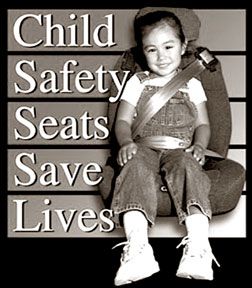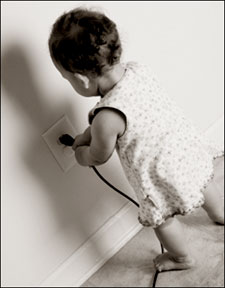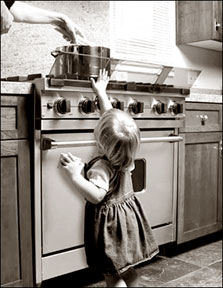Child safety: Child safety seats save lives
 Many accidents to children can be prevented if a few precautions are
taken. DR. B. RAMACHANDRAN outlines what needs to be done. Many accidents to children can be prevented if a few precautions are
taken. DR. B. RAMACHANDRAN outlines what needs to be done.
EACH year, hundreds of children are injured, some fatally. Often,
this happens in or around the house, while the parents or caretakers are
present. A few simple precautions can prevent many of these accidents.
Electrical
Electricity is dangerous. Children love to stick objects into exposed
electrical outlets. Use dummy plugs to cover unused outlets if these are
not readily available, simply buy a new plug and insert into the outlet.
Avoid leaving long lengths of power cords exposed the child can pull
these and cause an appliance to fall. Also make sure that all the power
cords are in good condition, without being frayed. Avoid using too many
extensions since these can overheat and cause a short circuit or a fire.
If you are having a new home or flat built, ask the electrical
contractors to install an Earth Linked Circuit Breaker (ELCB). This is a
device that will instantly shut off the supply to the home if it detects
an earth leak, such as when someone accidentally gets an electric shock.
You can also request that all the outlets and switches be installed
at a height above the reach of the average toddler.
The kitchen
 Many household accidents happen here. Many household accidents happen here.
Children love to play with fire - do not leave matches around where a
child can get hold of them. Teach children about fire safety from an
early age. Also, do not leave pots and pans on the gas or range
unsupervised. Ensure that the handles of saucepans or other vessels are
turned away - this will make it harder for a toddler to reach up and tip
the contents over himself.
Keep all knives, forks and other sharp objects out of reach. This
includes items like mixer blades.
Keep all kitchen and other household cleaners out of the reach of
children, preferably under lock and key. This also applies to kerosene,
if you use it.
The bathroom
Keep all cleaning agents, such as acids and detergents in a locked
cabinet. Many of these compounds are highly corrosive and can do serious
damage if ingested.
Adjust the temperature control on your geyser so that it is not too
hot - you should be able to hold your hand without discomfort in the hot
water stream.
Food safety
Many foods can be dangerous for small children since they can
aspirate the items, which will result in blockage of the breathing
passages.
The air passages of a child are relatively small and are easily
blocked. In addition, children often talk or laugh with food in their
mouth. It is difficult to enforce the following safety tips but medical
professionals see many disasters that could have easily been avoided.
Children under five years should not eat hard items like murukku and
hard candy. Nuts are especially dangerous. Popcorn (which is light) can
easily be aspirated into the lungs.
Teach children not to put too much food into their mouths and also
not to talk with food in the mouth.
Toys
 Many toys can be dangerous. There are no enforceable guidelines in
India about toy design and safety issues. You can take the following
steps to ensure that toys do not hurt your child. Many toys can be dangerous. There are no enforceable guidelines in
India about toy design and safety issues. You can take the following
steps to ensure that toys do not hurt your child.
Make sure that the toy is age appropriate what is suitable for an
older child may be unsafe for a younger child.
Watch out for toys with sharp edges and small parts - children below
three years can aspirate small parts and choke.
Avoid toys that have paint that peels off. The paint can be ingested
when a child puts it into his mouth.
If a toy uses button cells, be very careful since toddlers can
swallow them.
Baby walkers
Baby walkers can be extremely dangerous and are totally unnecessary.
Babies who use walkers do not start walking any faster than others.
However, babies do not have the ability to control the extra mobility
provided by a walker and can run into furniture or other objects, or
fall down stairs and get hurt.
General
Go around the house regularly and ensure that there are no sharp
edges exposed that can hurt a child. Keep all medicines out of the reach
of children. Many tablets look like candy and toddlers love to eat them.
Even medicines like iron tablets and vitamins are dangerous.
Do not give leftover medicines prescribed on a previous occasion or
for others to a child - it may be both inappropriate and dangerous. Do
not allow children to play unsupervised on balconies.
Do not allow children to play on the rooftop, even if supervised.
Most parapet walls are not high enough to prevent a child from falling
over.
Be extremely careful around stairs - infants and toddlers can easily
fall down and injure themselves. If you have open stairs in a house,
consider having a carpenter make a temporary safety gate until the child
is old enough to use the stairs without assistance.
Do not place chains or other closed loop like objects around a
child's neck. These can get caught on objects and strangulate the child.
Keep Jos sticks (incense sticks) and other burning objects well away
from children - children sometimes try to look at the glowing tip and
get burns on the face.
Do not allow children to play with or handle plastic bags - these can
suffocate a child if placed over the head.
Water safety
Children have no innate fear of water and must be carefully
supervised. Even a bucket with only a few inches of water at the bottom
can be a death trap for a toddler who could fall into it head first.
Be extremely wary when small children are in or near swimming pools
or other water bodies. Most incidents of drowning happen in the presence
of the parents or other adults. It is impossible for one person to
effectively supervise a group of children and one child can easily be
missed in a large group.
Travel safety
Two wheelers: No one should ride a scooter or motorcycle without
wearing a helmet. Since paediatric helmets are not available, ideally no
child should ride on a two-wheeler.
Children are much more prone to head injuries than adults because the
size of the head is larger relative to the body and therefore children
fall headfirst. Even a very low speed accident can cause serious or
fatal injury.
More than two people should never ride a two-wheeler. Unfortunately,
it is all too common to see entire families on the same vehicle.
Car Travel: Ideally, all occupants in a car should wear seat belts
even low speed accidents can cause serious injury to passengers not
wearing seat belts.
In addition, children should travel only in a properly designed child
safety seat. In the absence of car seats, the following safety measures
may be of some help.
Do not allow children to travel in the front - if the car stops
suddenly, the child will be thrown forward and can sustain serious head
injuries by hitting the windshield or dashboard.
Do not allow children to sit in an adult's lap. In the event of an
accident, both will be thrown forward and the adult's weight will crush
the child.
Wear seat belts, even if you mainly drive within the city - children
emulate adults and they too will learn to use seat belts if you set an
example. However, do not fit an adult seat belt onto a child until he is
old enough, otherwise serious damage can happen in the event of an
accident. In general, a child can wear an adult seat belt when he is
about 4.9 feet (145 cm) tall, or weighs more than 36 kg.
Do not allow children to play with items like pencils, sticks, etc.,
since these can injure the child or another occupant in the event of the
vehicle coming to a sudden stop.
Similarly, do not keep large, unrestrained objects in the passenger
compartment - these can be thrown out and injure occupants during a
sudden stop.
Courtesy: The Hindu
Women drinkers are fit to burst
 Women who binge drink may be damaging more than their liver, experts
warn. A report in the British Medical Journal said women are turning up
in hospital after a night on the tiles suffering from burst bladders. Women who binge drink may be damaging more than their liver, experts
warn. A report in the British Medical Journal said women are turning up
in hospital after a night on the tiles suffering from burst bladders.
The problem has previously only been reported in men who drink
excessive amounts of alcohol, said surgeons at Pinderfields Hospital in
Wakefield. When drunk, people may not realise they have an overly full
bladder, which can then rupture, they explained.
The NHS spends up to o3bn a year on alcohol-related problems, with
over 28,000 hospital admissions caused by alcohol dependence or
poisoning and 22,000 premature deaths each year.
In women, the feeling was because they have a short urethra they are
more likely to leak than rupture * Mr Mohantha Dooldeniya
Women have recently caught up with men in their alcohol consumption,
with 86% admitting they drink regularly compared with 91% of men.
Figures also show the proportion of young girls drinking has reached the
level of young boys.
Dr. Mohantha Dooldeniya, a surgeon at Pinderfields Hospital, said he
had seen three women in the space of 12 months who had suffered from a
burst bladder and needed surgery to repair the rupture.
The doctors did not recognise straightaway what the problem was,
because they did not expect to see it in women.
Two of the patients were treated for urine infection with
antibiotics. And the third was suspected to have appendicitis.
Dr. Dooldeniya said physicians needed to be aware that women
presenting with lower abdominal pain may be suffering from bladder
rupture.
In all the cases he had seen, binge drinking had led to an increased
volume of urine but the numbing effect of the alcohol meant the women
did not realise they needed the toilet.
"The reason this was first described in men is they have a longer
urethra so you need a lot more pressure to get urine out of the bladder.
"In women, the feeling was because they have a short urethra they are
more likely to leak than rupture," he said.
A minor trauma, such as a fall, can increase the risk, the bladder
will burst, he added. "All the women had come in the morning after they
had drunk a significant amount of alcohol and were all very vague about
what they had been up to."
A spokesperson for Alcohol Concern said: "Though it is difficult to
assess the prevalence of alcohol-related ruptures, these case studies
yet again remind us that for women, as well as men, the impact of
alcohol misuse on health can extend beyond well known conditions like
cirrhosis of the liver.
"The government's recommended daily limits remain the best protection
we have against alcohol-related harm." Professor Christopher Chapple, an
expert in urology at the University of Sheffield said rupture of the
bladder is a well-recognised complication of excessive alcohol drinking.
He added: "Because of the associated alcohol consumption they may not be
aware that they have actually injured themselves until some time later."
BBC NEWS
'Dead' yoghurt just as effective
The benefits of "live" yoghurt containing helpful strains of bacteria
persist - even when the bacteria it contains are dead.
Probiotic foods are popular, and have been found to help conditions
such as inflammatory bowel disease.
Researchers from California and Israel irradiated their probiotics to
kill the "friendly" bacteria. In the journal Gastroenterology, they
report that the product's effect on inflammation remained the same.
The use of probiotics dates back thousands of years - it is reported
that people in ancient Babylon drank sour milk to help problems in the
gut. They can be added to yoghurt and a small number of other
dairy-based products - as well as taken in capsule form.
However, in most foods, adding bacteria would lead to fermentation
within hours, changing the taste and texture of the product.
The finding from the University of California San Diego School of
Medicine and the Shaare Zedek Medical Center in Jerusalem potentially
opens the door for probiotics to be added to a far wider range of foods.
They gave irradiated probiotics to mice with gut inflammation induced
in the laboratory. The treatment reduced the inflammation in a similar
way to give "live" bacteria, and the researchers concluded that
irradiated probiotics were just as effective.
Professor Eyal Raz, one of the study authors, said: "Our goal was to
address whether the metabolic activity of probiotics was mandatory for
their protective effect."
The team believes that part of the body's immune system called the
"innate" immune system responded to the bugs, regardless of whether they
were dead or alive.
This immune response might be damping down the overactive response
within the gut.
However, experts say that the presence of live rather than
inactivated bacteria in the gut has several advantages.
Firstly, the simple fact that they are occupying space and attached
to the gut wall denies that space to harmful bacteria, particularly if
their numbers increase over time.
BBC NEWS |
